Delegation in Nursing: Nursing Essay, System04104, August 2019
VerifiedAdded on 2022/10/02
|8
|2757
|262
Essay
AI Summary
This essay examines the crucial topic of delegation in nursing, emphasizing its significance in healthcare settings. It explores the responsibilities of registered nurses (RNs) in delegating tasks to licensed practical nurses (LPNs) and other healthcare staff, highlighting the importance of effective communication, interpersonal relationships, and the assessment of individual competencies. The essay discusses various factors that impact delegation, such as trust, teamwork, and the need for proper training and evaluation of delegation skills. It also addresses the strategies for promoting patient-centered care, including positive communication, ensuring the competence of the staff, and the importance of accountability. The essay concludes by underscoring the vital role of delegation in enhancing patient outcomes and maximizing healthcare resources, while also acknowledging the challenges and complexities associated with delegation practices.
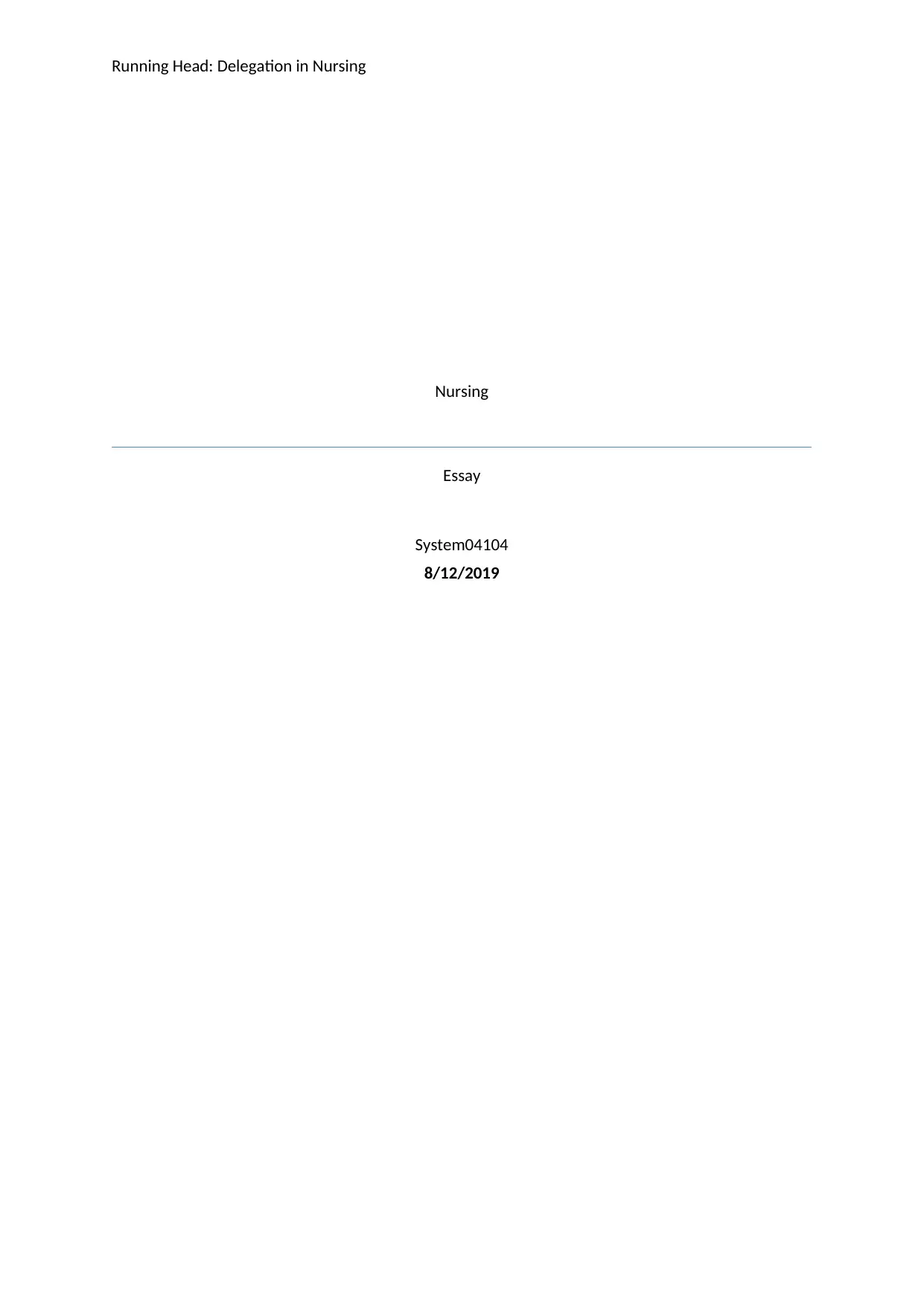
Running Head: Delegation in Nursing
Nursing
Essay
System04104
8/12/2019
Nursing
Essay
System04104
8/12/2019
Paraphrase This Document
Need a fresh take? Get an instant paraphrase of this document with our AI Paraphraser
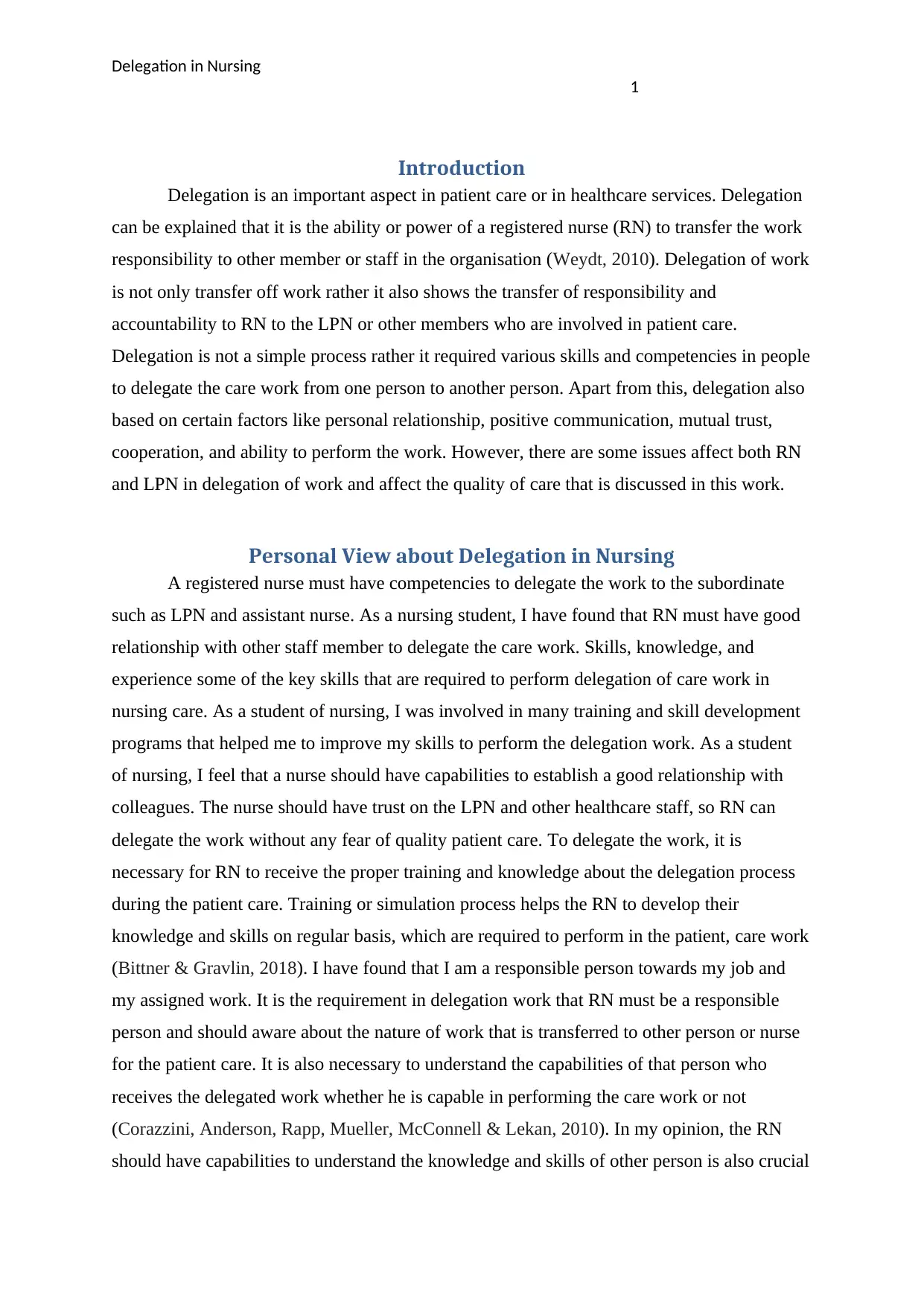
Delegation in Nursing
1
Introduction
Delegation is an important aspect in patient care or in healthcare services. Delegation
can be explained that it is the ability or power of a registered nurse (RN) to transfer the work
responsibility to other member or staff in the organisation (Weydt, 2010). Delegation of work
is not only transfer off work rather it also shows the transfer of responsibility and
accountability to RN to the LPN or other members who are involved in patient care.
Delegation is not a simple process rather it required various skills and competencies in people
to delegate the care work from one person to another person. Apart from this, delegation also
based on certain factors like personal relationship, positive communication, mutual trust,
cooperation, and ability to perform the work. However, there are some issues affect both RN
and LPN in delegation of work and affect the quality of care that is discussed in this work.
Personal View about Delegation in Nursing
A registered nurse must have competencies to delegate the work to the subordinate
such as LPN and assistant nurse. As a nursing student, I have found that RN must have good
relationship with other staff member to delegate the care work. Skills, knowledge, and
experience some of the key skills that are required to perform delegation of care work in
nursing care. As a student of nursing, I was involved in many training and skill development
programs that helped me to improve my skills to perform the delegation work. As a student
of nursing, I feel that a nurse should have capabilities to establish a good relationship with
colleagues. The nurse should have trust on the LPN and other healthcare staff, so RN can
delegate the work without any fear of quality patient care. To delegate the work, it is
necessary for RN to receive the proper training and knowledge about the delegation process
during the patient care. Training or simulation process helps the RN to develop their
knowledge and skills on regular basis, which are required to perform in the patient, care work
(Bittner & Gravlin, 2018). I have found that I am a responsible person towards my job and
my assigned work. It is the requirement in delegation work that RN must be a responsible
person and should aware about the nature of work that is transferred to other person or nurse
for the patient care. It is also necessary to understand the capabilities of that person who
receives the delegated work whether he is capable in performing the care work or not
(Corazzini, Anderson, Rapp, Mueller, McConnell & Lekan, 2010). In my opinion, the RN
should have capabilities to understand the knowledge and skills of other person is also crucial
1
Introduction
Delegation is an important aspect in patient care or in healthcare services. Delegation
can be explained that it is the ability or power of a registered nurse (RN) to transfer the work
responsibility to other member or staff in the organisation (Weydt, 2010). Delegation of work
is not only transfer off work rather it also shows the transfer of responsibility and
accountability to RN to the LPN or other members who are involved in patient care.
Delegation is not a simple process rather it required various skills and competencies in people
to delegate the care work from one person to another person. Apart from this, delegation also
based on certain factors like personal relationship, positive communication, mutual trust,
cooperation, and ability to perform the work. However, there are some issues affect both RN
and LPN in delegation of work and affect the quality of care that is discussed in this work.
Personal View about Delegation in Nursing
A registered nurse must have competencies to delegate the work to the subordinate
such as LPN and assistant nurse. As a nursing student, I have found that RN must have good
relationship with other staff member to delegate the care work. Skills, knowledge, and
experience some of the key skills that are required to perform delegation of care work in
nursing care. As a student of nursing, I was involved in many training and skill development
programs that helped me to improve my skills to perform the delegation work. As a student
of nursing, I feel that a nurse should have capabilities to establish a good relationship with
colleagues. The nurse should have trust on the LPN and other healthcare staff, so RN can
delegate the work without any fear of quality patient care. To delegate the work, it is
necessary for RN to receive the proper training and knowledge about the delegation process
during the patient care. Training or simulation process helps the RN to develop their
knowledge and skills on regular basis, which are required to perform in the patient, care work
(Bittner & Gravlin, 2018). I have found that I am a responsible person towards my job and
my assigned work. It is the requirement in delegation work that RN must be a responsible
person and should aware about the nature of work that is transferred to other person or nurse
for the patient care. It is also necessary to understand the capabilities of that person who
receives the delegated work whether he is capable in performing the care work or not
(Corazzini, Anderson, Rapp, Mueller, McConnell & Lekan, 2010). In my opinion, the RN
should have capabilities to understand the knowledge and skills of other person is also crucial
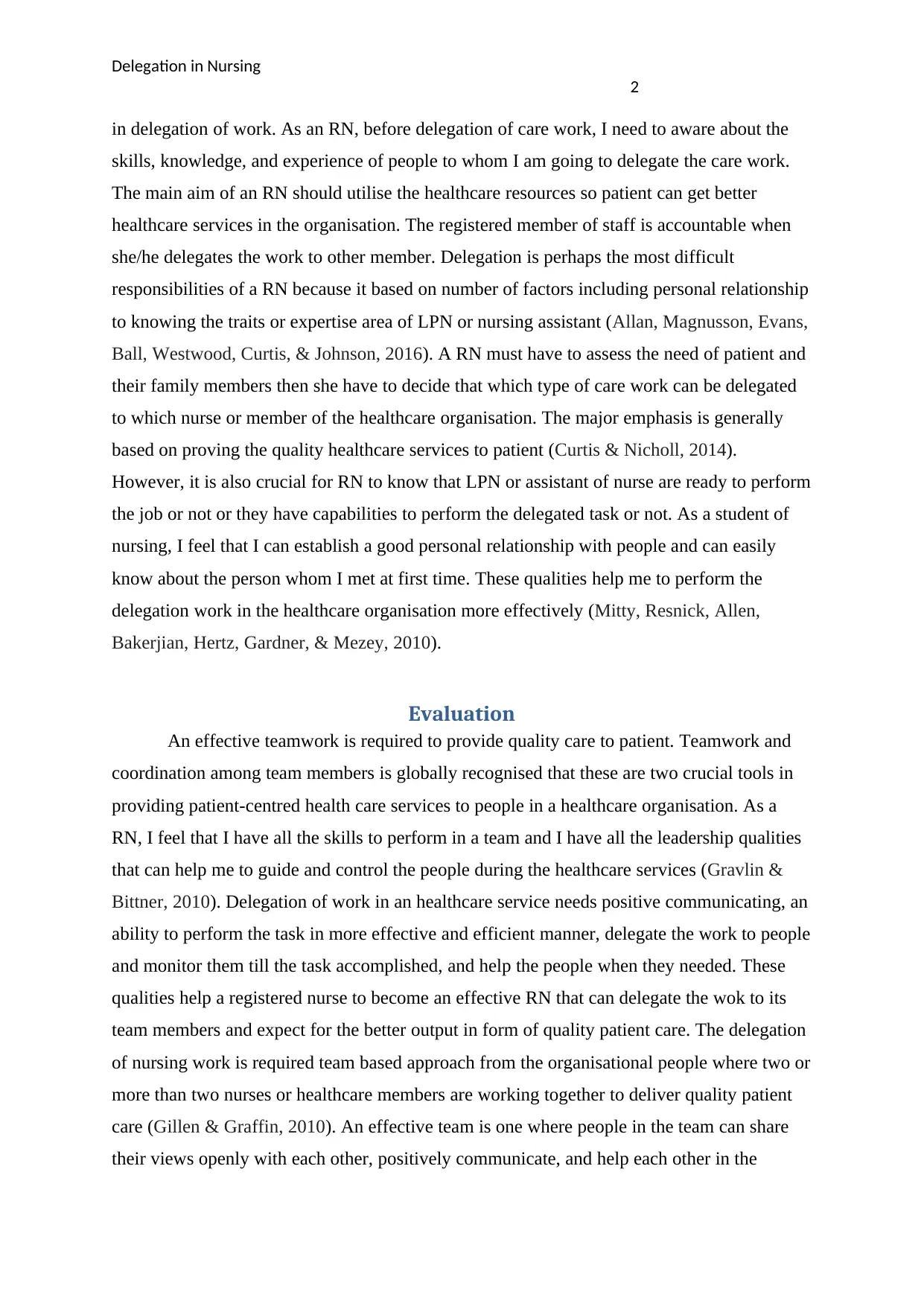
Delegation in Nursing
2
in delegation of work. As an RN, before delegation of care work, I need to aware about the
skills, knowledge, and experience of people to whom I am going to delegate the care work.
The main aim of an RN should utilise the healthcare resources so patient can get better
healthcare services in the organisation. The registered member of staff is accountable when
she/he delegates the work to other member. Delegation is perhaps the most difficult
responsibilities of a RN because it based on number of factors including personal relationship
to knowing the traits or expertise area of LPN or nursing assistant (Allan, Magnusson, Evans,
Ball, Westwood, Curtis, & Johnson, 2016). A RN must have to assess the need of patient and
their family members then she have to decide that which type of care work can be delegated
to which nurse or member of the healthcare organisation. The major emphasis is generally
based on proving the quality healthcare services to patient (Curtis & Nicholl, 2014).
However, it is also crucial for RN to know that LPN or assistant of nurse are ready to perform
the job or not or they have capabilities to perform the delegated task or not. As a student of
nursing, I feel that I can establish a good personal relationship with people and can easily
know about the person whom I met at first time. These qualities help me to perform the
delegation work in the healthcare organisation more effectively (Mitty, Resnick, Allen,
Bakerjian, Hertz, Gardner, & Mezey, 2010).
Evaluation
An effective teamwork is required to provide quality care to patient. Teamwork and
coordination among team members is globally recognised that these are two crucial tools in
providing patient-centred health care services to people in a healthcare organisation. As a
RN, I feel that I have all the skills to perform in a team and I have all the leadership qualities
that can help me to guide and control the people during the healthcare services (Gravlin &
Bittner, 2010). Delegation of work in an healthcare service needs positive communicating, an
ability to perform the task in more effective and efficient manner, delegate the work to people
and monitor them till the task accomplished, and help the people when they needed. These
qualities help a registered nurse to become an effective RN that can delegate the wok to its
team members and expect for the better output in form of quality patient care. The delegation
of nursing work is required team based approach from the organisational people where two or
more than two nurses or healthcare members are working together to deliver quality patient
care (Gillen & Graffin, 2010). An effective team is one where people in the team can share
their views openly with each other, positively communicate, and help each other in the
2
in delegation of work. As an RN, before delegation of care work, I need to aware about the
skills, knowledge, and experience of people to whom I am going to delegate the care work.
The main aim of an RN should utilise the healthcare resources so patient can get better
healthcare services in the organisation. The registered member of staff is accountable when
she/he delegates the work to other member. Delegation is perhaps the most difficult
responsibilities of a RN because it based on number of factors including personal relationship
to knowing the traits or expertise area of LPN or nursing assistant (Allan, Magnusson, Evans,
Ball, Westwood, Curtis, & Johnson, 2016). A RN must have to assess the need of patient and
their family members then she have to decide that which type of care work can be delegated
to which nurse or member of the healthcare organisation. The major emphasis is generally
based on proving the quality healthcare services to patient (Curtis & Nicholl, 2014).
However, it is also crucial for RN to know that LPN or assistant of nurse are ready to perform
the job or not or they have capabilities to perform the delegated task or not. As a student of
nursing, I feel that I can establish a good personal relationship with people and can easily
know about the person whom I met at first time. These qualities help me to perform the
delegation work in the healthcare organisation more effectively (Mitty, Resnick, Allen,
Bakerjian, Hertz, Gardner, & Mezey, 2010).
Evaluation
An effective teamwork is required to provide quality care to patient. Teamwork and
coordination among team members is globally recognised that these are two crucial tools in
providing patient-centred health care services to people in a healthcare organisation. As a
RN, I feel that I have all the skills to perform in a team and I have all the leadership qualities
that can help me to guide and control the people during the healthcare services (Gravlin &
Bittner, 2010). Delegation of work in an healthcare service needs positive communicating, an
ability to perform the task in more effective and efficient manner, delegate the work to people
and monitor them till the task accomplished, and help the people when they needed. These
qualities help a registered nurse to become an effective RN that can delegate the wok to its
team members and expect for the better output in form of quality patient care. The delegation
of nursing work is required team based approach from the organisational people where two or
more than two nurses or healthcare members are working together to deliver quality patient
care (Gillen & Graffin, 2010). An effective team is one where people in the team can share
their views openly with each other, positively communicate, and help each other in the
⊘ This is a preview!⊘
Do you want full access?
Subscribe today to unlock all pages.

Trusted by 1+ million students worldwide
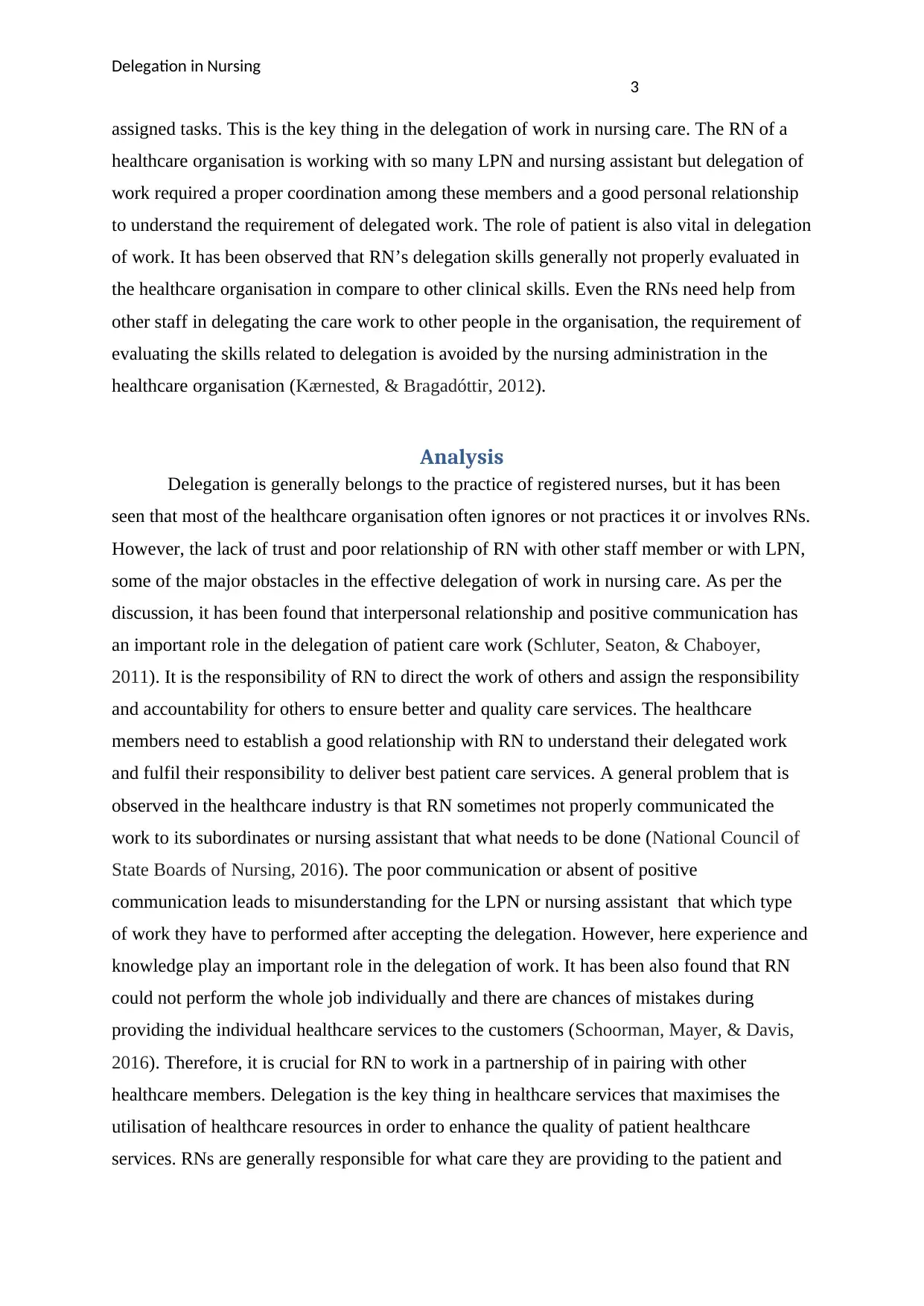
Delegation in Nursing
3
assigned tasks. This is the key thing in the delegation of work in nursing care. The RN of a
healthcare organisation is working with so many LPN and nursing assistant but delegation of
work required a proper coordination among these members and a good personal relationship
to understand the requirement of delegated work. The role of patient is also vital in delegation
of work. It has been observed that RN’s delegation skills generally not properly evaluated in
the healthcare organisation in compare to other clinical skills. Even the RNs need help from
other staff in delegating the care work to other people in the organisation, the requirement of
evaluating the skills related to delegation is avoided by the nursing administration in the
healthcare organisation (Kærnested, & Bragadóttir, 2012).
Analysis
Delegation is generally belongs to the practice of registered nurses, but it has been
seen that most of the healthcare organisation often ignores or not practices it or involves RNs.
However, the lack of trust and poor relationship of RN with other staff member or with LPN,
some of the major obstacles in the effective delegation of work in nursing care. As per the
discussion, it has been found that interpersonal relationship and positive communication has
an important role in the delegation of patient care work (Schluter, Seaton, & Chaboyer,
2011). It is the responsibility of RN to direct the work of others and assign the responsibility
and accountability for others to ensure better and quality care services. The healthcare
members need to establish a good relationship with RN to understand their delegated work
and fulfil their responsibility to deliver best patient care services. A general problem that is
observed in the healthcare industry is that RN sometimes not properly communicated the
work to its subordinates or nursing assistant that what needs to be done (National Council of
State Boards of Nursing, 2016). The poor communication or absent of positive
communication leads to misunderstanding for the LPN or nursing assistant that which type
of work they have to performed after accepting the delegation. However, here experience and
knowledge play an important role in the delegation of work. It has been also found that RN
could not perform the whole job individually and there are chances of mistakes during
providing the individual healthcare services to the customers (Schoorman, Mayer, & Davis,
2016). Therefore, it is crucial for RN to work in a partnership of in pairing with other
healthcare members. Delegation is the key thing in healthcare services that maximises the
utilisation of healthcare resources in order to enhance the quality of patient healthcare
services. RNs are generally responsible for what care they are providing to the patient and
3
assigned tasks. This is the key thing in the delegation of work in nursing care. The RN of a
healthcare organisation is working with so many LPN and nursing assistant but delegation of
work required a proper coordination among these members and a good personal relationship
to understand the requirement of delegated work. The role of patient is also vital in delegation
of work. It has been observed that RN’s delegation skills generally not properly evaluated in
the healthcare organisation in compare to other clinical skills. Even the RNs need help from
other staff in delegating the care work to other people in the organisation, the requirement of
evaluating the skills related to delegation is avoided by the nursing administration in the
healthcare organisation (Kærnested, & Bragadóttir, 2012).
Analysis
Delegation is generally belongs to the practice of registered nurses, but it has been
seen that most of the healthcare organisation often ignores or not practices it or involves RNs.
However, the lack of trust and poor relationship of RN with other staff member or with LPN,
some of the major obstacles in the effective delegation of work in nursing care. As per the
discussion, it has been found that interpersonal relationship and positive communication has
an important role in the delegation of patient care work (Schluter, Seaton, & Chaboyer,
2011). It is the responsibility of RN to direct the work of others and assign the responsibility
and accountability for others to ensure better and quality care services. The healthcare
members need to establish a good relationship with RN to understand their delegated work
and fulfil their responsibility to deliver best patient care services. A general problem that is
observed in the healthcare industry is that RN sometimes not properly communicated the
work to its subordinates or nursing assistant that what needs to be done (National Council of
State Boards of Nursing, 2016). The poor communication or absent of positive
communication leads to misunderstanding for the LPN or nursing assistant that which type
of work they have to performed after accepting the delegation. However, here experience and
knowledge play an important role in the delegation of work. It has been also found that RN
could not perform the whole job individually and there are chances of mistakes during
providing the individual healthcare services to the customers (Schoorman, Mayer, & Davis,
2016). Therefore, it is crucial for RN to work in a partnership of in pairing with other
healthcare members. Delegation is the key thing in healthcare services that maximises the
utilisation of healthcare resources in order to enhance the quality of patient healthcare
services. RNs are generally responsible for what care they are providing to the patient and
Paraphrase This Document
Need a fresh take? Get an instant paraphrase of this document with our AI Paraphraser
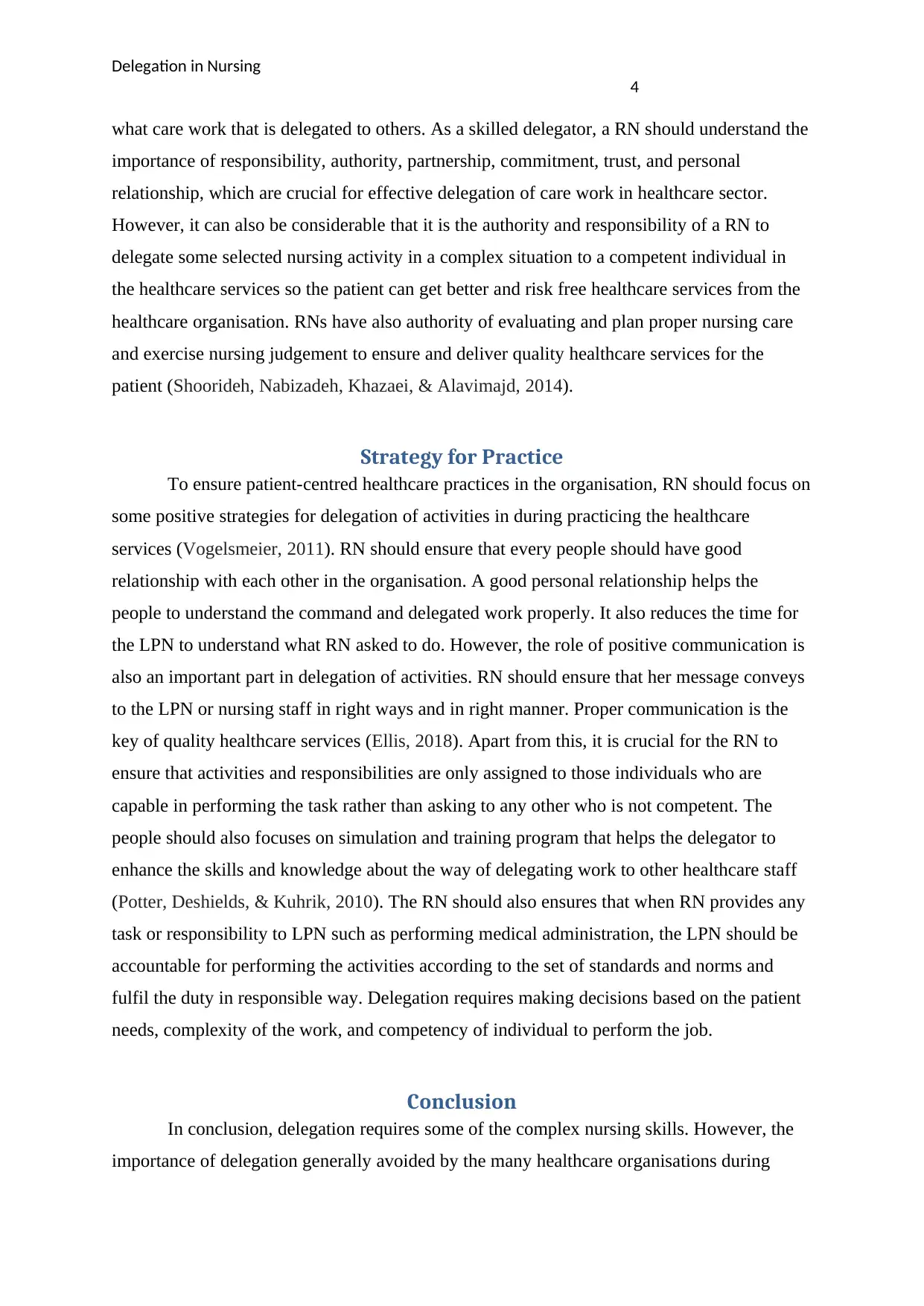
Delegation in Nursing
4
what care work that is delegated to others. As a skilled delegator, a RN should understand the
importance of responsibility, authority, partnership, commitment, trust, and personal
relationship, which are crucial for effective delegation of care work in healthcare sector.
However, it can also be considerable that it is the authority and responsibility of a RN to
delegate some selected nursing activity in a complex situation to a competent individual in
the healthcare services so the patient can get better and risk free healthcare services from the
healthcare organisation. RNs have also authority of evaluating and plan proper nursing care
and exercise nursing judgement to ensure and deliver quality healthcare services for the
patient (Shoorideh, Nabizadeh, Khazaei, & Alavimajd, 2014).
Strategy for Practice
To ensure patient-centred healthcare practices in the organisation, RN should focus on
some positive strategies for delegation of activities in during practicing the healthcare
services (Vogelsmeier, 2011). RN should ensure that every people should have good
relationship with each other in the organisation. A good personal relationship helps the
people to understand the command and delegated work properly. It also reduces the time for
the LPN to understand what RN asked to do. However, the role of positive communication is
also an important part in delegation of activities. RN should ensure that her message conveys
to the LPN or nursing staff in right ways and in right manner. Proper communication is the
key of quality healthcare services (Ellis, 2018). Apart from this, it is crucial for the RN to
ensure that activities and responsibilities are only assigned to those individuals who are
capable in performing the task rather than asking to any other who is not competent. The
people should also focuses on simulation and training program that helps the delegator to
enhance the skills and knowledge about the way of delegating work to other healthcare staff
(Potter, Deshields, & Kuhrik, 2010). The RN should also ensures that when RN provides any
task or responsibility to LPN such as performing medical administration, the LPN should be
accountable for performing the activities according to the set of standards and norms and
fulfil the duty in responsible way. Delegation requires making decisions based on the patient
needs, complexity of the work, and competency of individual to perform the job.
Conclusion
In conclusion, delegation requires some of the complex nursing skills. However, the
importance of delegation generally avoided by the many healthcare organisations during
4
what care work that is delegated to others. As a skilled delegator, a RN should understand the
importance of responsibility, authority, partnership, commitment, trust, and personal
relationship, which are crucial for effective delegation of care work in healthcare sector.
However, it can also be considerable that it is the authority and responsibility of a RN to
delegate some selected nursing activity in a complex situation to a competent individual in
the healthcare services so the patient can get better and risk free healthcare services from the
healthcare organisation. RNs have also authority of evaluating and plan proper nursing care
and exercise nursing judgement to ensure and deliver quality healthcare services for the
patient (Shoorideh, Nabizadeh, Khazaei, & Alavimajd, 2014).
Strategy for Practice
To ensure patient-centred healthcare practices in the organisation, RN should focus on
some positive strategies for delegation of activities in during practicing the healthcare
services (Vogelsmeier, 2011). RN should ensure that every people should have good
relationship with each other in the organisation. A good personal relationship helps the
people to understand the command and delegated work properly. It also reduces the time for
the LPN to understand what RN asked to do. However, the role of positive communication is
also an important part in delegation of activities. RN should ensure that her message conveys
to the LPN or nursing staff in right ways and in right manner. Proper communication is the
key of quality healthcare services (Ellis, 2018). Apart from this, it is crucial for the RN to
ensure that activities and responsibilities are only assigned to those individuals who are
capable in performing the task rather than asking to any other who is not competent. The
people should also focuses on simulation and training program that helps the delegator to
enhance the skills and knowledge about the way of delegating work to other healthcare staff
(Potter, Deshields, & Kuhrik, 2010). The RN should also ensures that when RN provides any
task or responsibility to LPN such as performing medical administration, the LPN should be
accountable for performing the activities according to the set of standards and norms and
fulfil the duty in responsible way. Delegation requires making decisions based on the patient
needs, complexity of the work, and competency of individual to perform the job.
Conclusion
In conclusion, delegation requires some of the complex nursing skills. However, the
importance of delegation generally avoided by the many healthcare organisations during
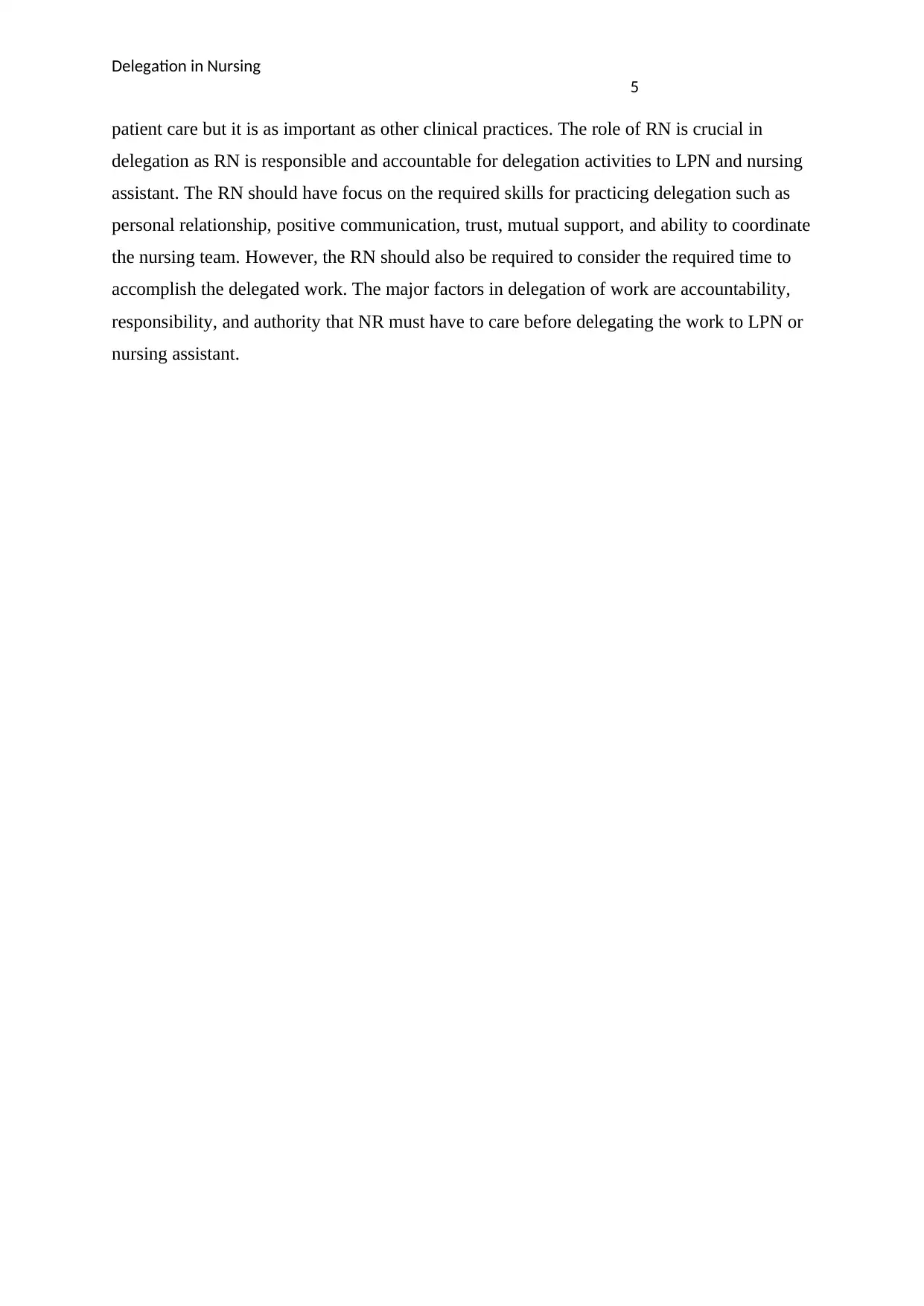
Delegation in Nursing
5
patient care but it is as important as other clinical practices. The role of RN is crucial in
delegation as RN is responsible and accountable for delegation activities to LPN and nursing
assistant. The RN should have focus on the required skills for practicing delegation such as
personal relationship, positive communication, trust, mutual support, and ability to coordinate
the nursing team. However, the RN should also be required to consider the required time to
accomplish the delegated work. The major factors in delegation of work are accountability,
responsibility, and authority that NR must have to care before delegating the work to LPN or
nursing assistant.
5
patient care but it is as important as other clinical practices. The role of RN is crucial in
delegation as RN is responsible and accountable for delegation activities to LPN and nursing
assistant. The RN should have focus on the required skills for practicing delegation such as
personal relationship, positive communication, trust, mutual support, and ability to coordinate
the nursing team. However, the RN should also be required to consider the required time to
accomplish the delegated work. The major factors in delegation of work are accountability,
responsibility, and authority that NR must have to care before delegating the work to LPN or
nursing assistant.
⊘ This is a preview!⊘
Do you want full access?
Subscribe today to unlock all pages.

Trusted by 1+ million students worldwide
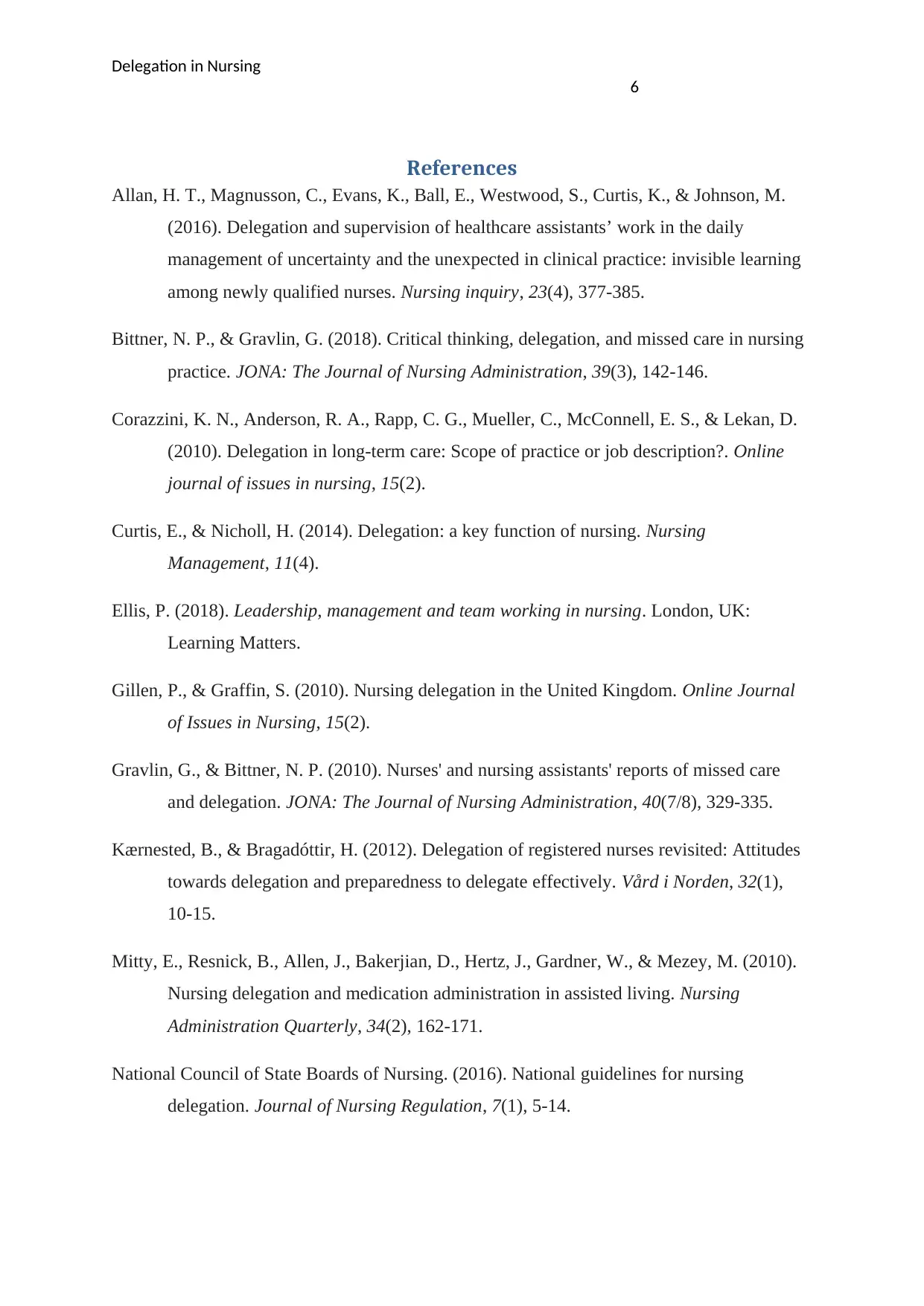
Delegation in Nursing
6
References
Allan, H. T., Magnusson, C., Evans, K., Ball, E., Westwood, S., Curtis, K., & Johnson, M.
(2016). Delegation and supervision of healthcare assistants’ work in the daily
management of uncertainty and the unexpected in clinical practice: invisible learning
among newly qualified nurses. Nursing inquiry, 23(4), 377-385.
Bittner, N. P., & Gravlin, G. (2018). Critical thinking, delegation, and missed care in nursing
practice. JONA: The Journal of Nursing Administration, 39(3), 142-146.
Corazzini, K. N., Anderson, R. A., Rapp, C. G., Mueller, C., McConnell, E. S., & Lekan, D.
(2010). Delegation in long-term care: Scope of practice or job description?. Online
journal of issues in nursing, 15(2).
Curtis, E., & Nicholl, H. (2014). Delegation: a key function of nursing. Nursing
Management, 11(4).
Ellis, P. (2018). Leadership, management and team working in nursing. London, UK:
Learning Matters.
Gillen, P., & Graffin, S. (2010). Nursing delegation in the United Kingdom. Online Journal
of Issues in Nursing, 15(2).
Gravlin, G., & Bittner, N. P. (2010). Nurses' and nursing assistants' reports of missed care
and delegation. JONA: The Journal of Nursing Administration, 40(7/8), 329-335.
Kærnested, B., & Bragadóttir, H. (2012). Delegation of registered nurses revisited: Attitudes
towards delegation and preparedness to delegate effectively. Vård i Norden, 32(1),
10-15.
Mitty, E., Resnick, B., Allen, J., Bakerjian, D., Hertz, J., Gardner, W., & Mezey, M. (2010).
Nursing delegation and medication administration in assisted living. Nursing
Administration Quarterly, 34(2), 162-171.
National Council of State Boards of Nursing. (2016). National guidelines for nursing
delegation. Journal of Nursing Regulation, 7(1), 5-14.
6
References
Allan, H. T., Magnusson, C., Evans, K., Ball, E., Westwood, S., Curtis, K., & Johnson, M.
(2016). Delegation and supervision of healthcare assistants’ work in the daily
management of uncertainty and the unexpected in clinical practice: invisible learning
among newly qualified nurses. Nursing inquiry, 23(4), 377-385.
Bittner, N. P., & Gravlin, G. (2018). Critical thinking, delegation, and missed care in nursing
practice. JONA: The Journal of Nursing Administration, 39(3), 142-146.
Corazzini, K. N., Anderson, R. A., Rapp, C. G., Mueller, C., McConnell, E. S., & Lekan, D.
(2010). Delegation in long-term care: Scope of practice or job description?. Online
journal of issues in nursing, 15(2).
Curtis, E., & Nicholl, H. (2014). Delegation: a key function of nursing. Nursing
Management, 11(4).
Ellis, P. (2018). Leadership, management and team working in nursing. London, UK:
Learning Matters.
Gillen, P., & Graffin, S. (2010). Nursing delegation in the United Kingdom. Online Journal
of Issues in Nursing, 15(2).
Gravlin, G., & Bittner, N. P. (2010). Nurses' and nursing assistants' reports of missed care
and delegation. JONA: The Journal of Nursing Administration, 40(7/8), 329-335.
Kærnested, B., & Bragadóttir, H. (2012). Delegation of registered nurses revisited: Attitudes
towards delegation and preparedness to delegate effectively. Vård i Norden, 32(1),
10-15.
Mitty, E., Resnick, B., Allen, J., Bakerjian, D., Hertz, J., Gardner, W., & Mezey, M. (2010).
Nursing delegation and medication administration in assisted living. Nursing
Administration Quarterly, 34(2), 162-171.
National Council of State Boards of Nursing. (2016). National guidelines for nursing
delegation. Journal of Nursing Regulation, 7(1), 5-14.
Paraphrase This Document
Need a fresh take? Get an instant paraphrase of this document with our AI Paraphraser
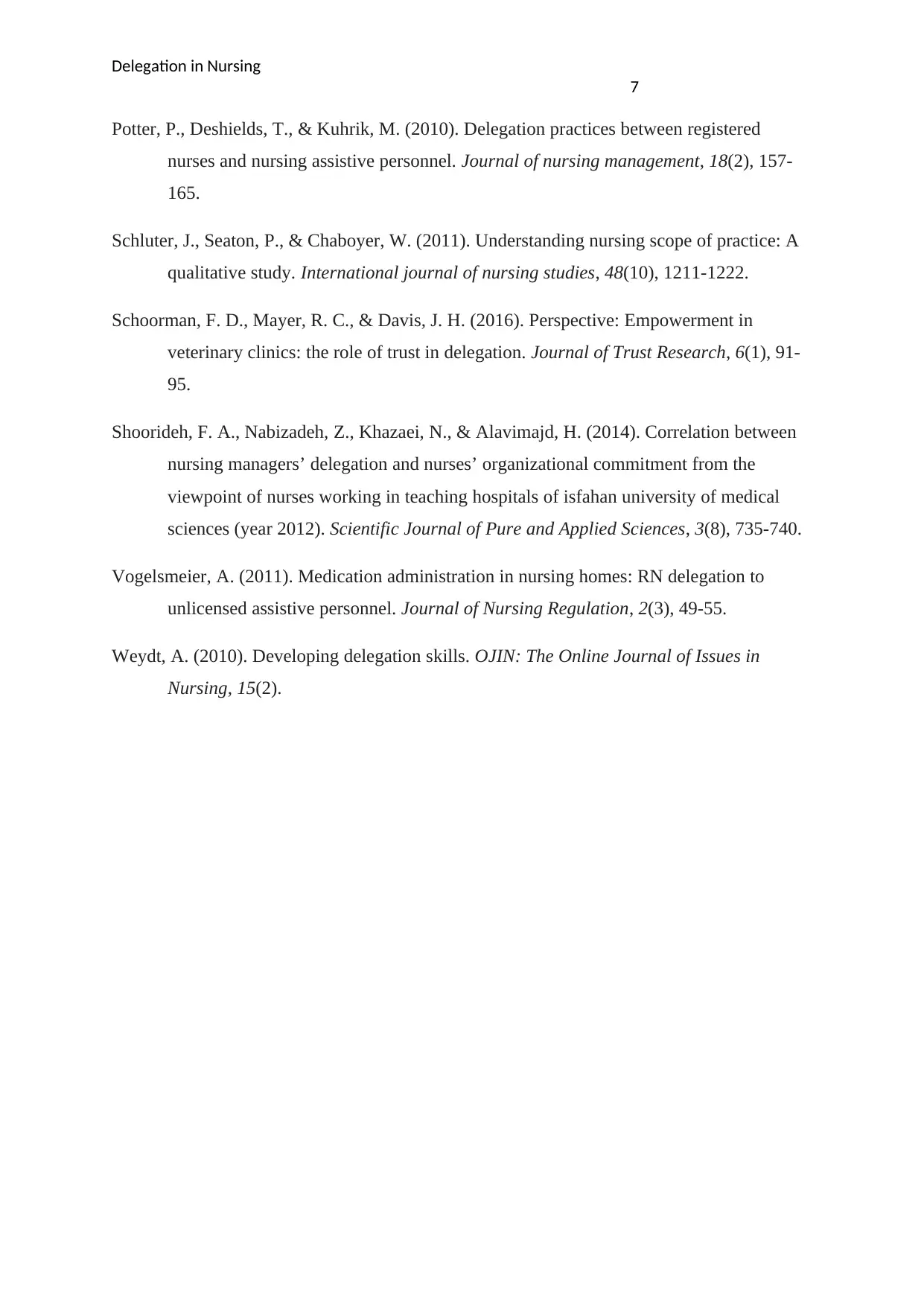
Delegation in Nursing
7
Potter, P., Deshields, T., & Kuhrik, M. (2010). Delegation practices between registered
nurses and nursing assistive personnel. Journal of nursing management, 18(2), 157-
165.
Schluter, J., Seaton, P., & Chaboyer, W. (2011). Understanding nursing scope of practice: A
qualitative study. International journal of nursing studies, 48(10), 1211-1222.
Schoorman, F. D., Mayer, R. C., & Davis, J. H. (2016). Perspective: Empowerment in
veterinary clinics: the role of trust in delegation. Journal of Trust Research, 6(1), 91-
95.
Shoorideh, F. A., Nabizadeh, Z., Khazaei, N., & Alavimajd, H. (2014). Correlation between
nursing managers’ delegation and nurses’ organizational commitment from the
viewpoint of nurses working in teaching hospitals of isfahan university of medical
sciences (year 2012). Scientific Journal of Pure and Applied Sciences, 3(8), 735-740.
Vogelsmeier, A. (2011). Medication administration in nursing homes: RN delegation to
unlicensed assistive personnel. Journal of Nursing Regulation, 2(3), 49-55.
Weydt, A. (2010). Developing delegation skills. OJIN: The Online Journal of Issues in
Nursing, 15(2).
7
Potter, P., Deshields, T., & Kuhrik, M. (2010). Delegation practices between registered
nurses and nursing assistive personnel. Journal of nursing management, 18(2), 157-
165.
Schluter, J., Seaton, P., & Chaboyer, W. (2011). Understanding nursing scope of practice: A
qualitative study. International journal of nursing studies, 48(10), 1211-1222.
Schoorman, F. D., Mayer, R. C., & Davis, J. H. (2016). Perspective: Empowerment in
veterinary clinics: the role of trust in delegation. Journal of Trust Research, 6(1), 91-
95.
Shoorideh, F. A., Nabizadeh, Z., Khazaei, N., & Alavimajd, H. (2014). Correlation between
nursing managers’ delegation and nurses’ organizational commitment from the
viewpoint of nurses working in teaching hospitals of isfahan university of medical
sciences (year 2012). Scientific Journal of Pure and Applied Sciences, 3(8), 735-740.
Vogelsmeier, A. (2011). Medication administration in nursing homes: RN delegation to
unlicensed assistive personnel. Journal of Nursing Regulation, 2(3), 49-55.
Weydt, A. (2010). Developing delegation skills. OJIN: The Online Journal of Issues in
Nursing, 15(2).
1 out of 8
Related Documents
Your All-in-One AI-Powered Toolkit for Academic Success.
+13062052269
info@desklib.com
Available 24*7 on WhatsApp / Email
![[object Object]](/_next/static/media/star-bottom.7253800d.svg)
Unlock your academic potential
Copyright © 2020–2025 A2Z Services. All Rights Reserved. Developed and managed by ZUCOL.





